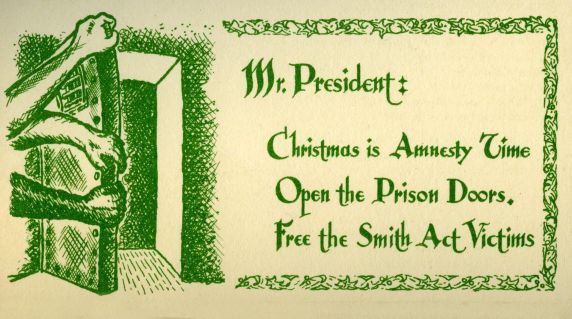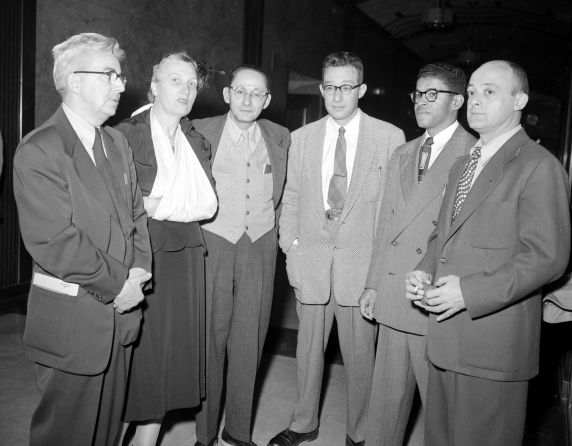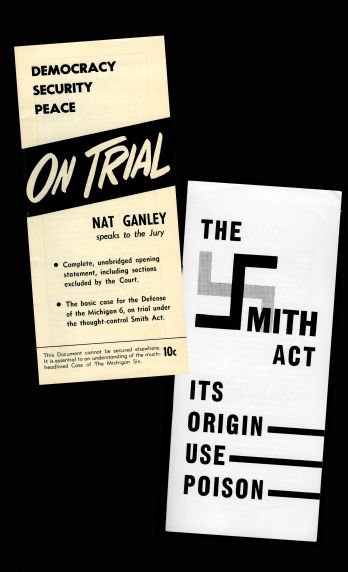Trial of the Michigan Six
On October 14, 1949, 11 members of the National Board of the Communist Party of the United States (CPUSA) were convicted of violating the Smith Act of 1940 by advocating the overthrow of the government of the United States with force and violence. The ten-month trial, which took place in New York City, captured the country’s attention with its sensational events both inside and outside of the courtroom. More importantly, it established a precedent for prosecuting other communists across the country.
Originally intended by its author to aid in the deportation of labor organizers as part of the Alien Registration Act, the Smith Act produced over 200 indictments nationally, including six prominent CPUSA members from Michigan. In Michigan's "Little Smith Act" trial of 1953, Saul Laurence Wellman, Nathan Kaplan (aka Nat Ganley), Thomas Dewitt Dennis, Jr., Philip Schatz, Helen Mary Winter (wife of Carl Winter, convicted in the New York trial), and William Allan were also charged with attempting to violently overthrow the government. As in the New York case, it was difficult for the defendants, who came to be known as the “Michigan Six,” to find a willing attorney due to threats, intimidation, and contempt of court charges. Detroit attorney Ernest Goodman stepped forward to represent Winter, Schatz, and Allan, despite the incarceration of his legal partner George W. Crockett, Jr. after participating in the New York trial. Ganley, Wellman, and Dennis acted as their own counsel.
For the government’s case, United States Attorney Frederick W. Kaess called a series of expert witnesses, informants, and former party members. The informants, who received compensation for their services, traveled from trial to trial to testify about the CPUSA. One of the key government witnesses, Milton Stanwire, would later admit to committing perjury during the trial.
The defense presented evidence on the Communist Party’s position against force and violence. Lead defendant Saul Wellman, who became chairman of the Michigan party after Carl Winter was convicted, highlighted the constitution of the CPUSA adopted in 1945, which specifically provides that “any member who participates in any activity aimed at overthrowing any institutions of American democracy shall be immediately expelled.” In addition, the defense hoped to benefit from the military service of three of the defendants. Wellman in particular proved to be a challenge for the prosecution, as his distinguished service in the Spanish Civil War and World War II, where he was critically injured during the Battle of the Bulge, directly contradicted the image of a traitor.
After 59 days of testimony, the jury in Michigan’s most notable political trial deliberated for only six hours. The Michigan Six joined dozens of other American Communists convicted in Smith Act trials across the country. One of the jurists stated that he believed the six defendants were “the victims of Russianitus.” Federal Judge Frank A. Picard extended an offer to the six: go to prison or move to Russia. The defendants declined Judge Picard’s offer to leave the country, and their prison sentences ranged from four to five years. In addition, each was fined $10,000, the maximum allowable under the Smith Act. In 1957, eight years after the first trial, the United States Supreme Court ended similar prosecutions with the decision in Yates v. United States. In March 1958 the convictions of the Michigan Six were thrown out, and federal prosecutors were unable to produce enough evidence for a retrial. Despite the eventual legal victories, the CPUSA was never able to fully recover from the loss of leadership or damage to its public image.

For more information about the CPUSA or Smith Act trials, see the Nat Ganley and Saul Wellman Papers, Nat Ganley Papers, Ernest Goodman Papers, Elizabeth Gurley Flynn Papers, George Crockett Papers, and the Civil Rights Congress of Michigan Records.
The Reuther is also home to Saul Wellman’s personal book collection, which includes a rare pamphlet series on communism. Search the Wayne State University Library Catalog for a full list of titles (Keywords: "Saul Wellman Book Collection"). In addition, photographs of the Michigan Six are available in the Virtual Motor City.
Kristen Chinery is the Librarian for the Walter P. Reuther Library.
- kchinery's blog
- Login to post comments
- Printer-friendly version



 Reddit
Reddit Facebook
Facebook LinkedIn
LinkedIn